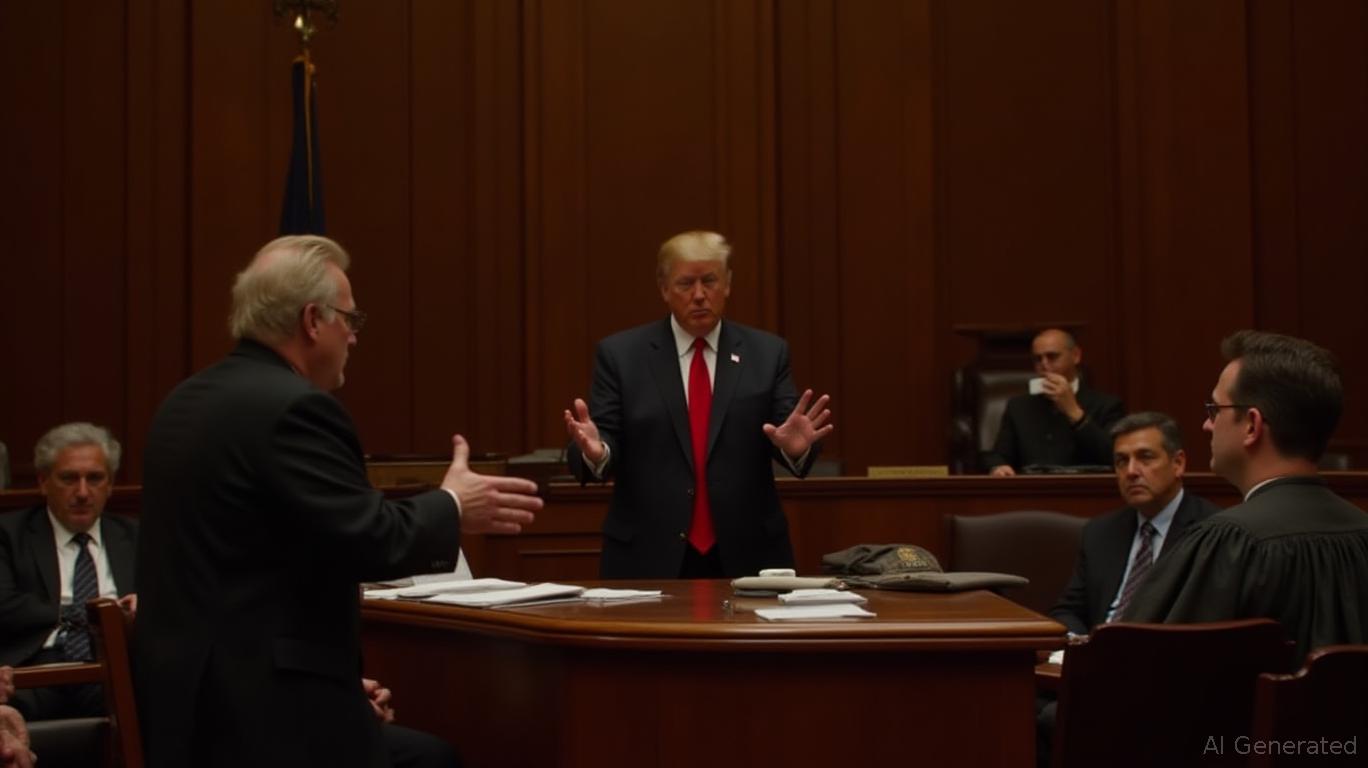Supreme Court Decision on Tariffs May Reshape Limits of Presidential Authority
- U.S. Supreme Court will rule on Trump's IEEPA-based tariffs, testing presidential power limits under constitutional law. - Lower courts invalidated tariffs, arguing Congress retains tariff authority under Article I despite IEEPA's emergency powers. - "Major questions doctrine" could limit executive overreach, but conservative justices may split on emergency powers interpretation. - Trump threatens retaliation by reimposing tariffs via alternative statutes if IEEPA case fails, complicating but not halting
The Supreme Court is on the verge of issuing a significant decision regarding President Donald Trump’s broad tariff initiatives, sparking debate among legal scholars and political commentators about whether the executive branch has exceeded its constitutional limits. This case, which challenges the extent of presidential authority under the International Emergency Economic Powers Act (IEEPA), has attracted intense examination from both progressive and conservative legal minds, who caution that the verdict could alter the distribution of power between Congress and the presidency, according to
The central issue is Trump’s claim that he can independently levy tariffs on almost all U.S. trade partners using IEEPA, a 1977 statute intended for national emergencies. He has invoked this law to justify tariffs on countries like China, Mexico, and Canada, citing concerns such as fentanyl trafficking and trade deficits, and later broadened the policy globally with “reciprocal” tariffs ranging from 10% to 50%, as

This legal confrontation has brought renewed focus to the so-called “major questions doctrine,” a principle recently championed by the Court’s conservative members. This doctrine asserts that Congress must clearly authorize government actions with far-reaching economic or political effects, a point highlighted in the New York Magazine article. In 2023, the Court relied on this doctrine to overturn President Biden’s student loan forgiveness plan, and in 2022, it limited the EPA’s regulatory authority over climate policy. Legal experts believe the same reasoning could be applied to Trump’s tariffs, potentially bringing together justices from both sides to curb executive overreach; though some conservatives may hesitate, given their history of supporting broad emergency powers.
Trump has reaffirmed his stance, pledging to attend the November 5 oral arguments—an unprecedented move for a sitting president—and describing the case as “one of the most important in the history of our country,” Barron's reported. His administration contends that overturning the tariffs would expose the U.S. to trade reprisals and jeopardize national security, as
Should the Court rule against Trump, the administration has backup strategies. Officials have indicated they could reinstate tariffs using other laws, such as the Trade Act of 1974, though this would be slower and more limited in scope, as
The political stakes are also high. A loss could spare the U.S. economy from an estimated $3 trillion in tariffs over the next ten years, according to the Congressional Budget Office, while giving Trump an opportunity to portray the Court as a partisan barrier to his policies, as discussed in the New York Magazine article. On the other hand, a victory would empower future presidents to use emergency declarations for sweeping unilateral actions, diminishing congressional oversight, according to
As the Supreme Court weighs its decision, this case has become a critical test of the judiciary’s dedication to constitutional limits. With justices like Chief Justice John Roberts and Amy Coney Barrett potentially playing decisive roles, the outcome will not only influence Trump’s potential second term but also set a long-term precedent for presidential authority, as argued in the New York Magazine article.
Disclaimer: The content of this article solely reflects the author's opinion and does not represent the platform in any capacity. This article is not intended to serve as a reference for making investment decisions.
You may also like
DASH experiences a 33.07% jump fueled by urgent meal deliveries and targeted growth initiatives
- DoorDash launched an Emergency Food Response initiative, pledging 1 million free meals and waived fees for 300,000 SNAP-eligible grocery orders in November. - The program partners with 25+ grocery chains to address federal SNAP benefit pauses, enhancing DoorDash's role in crisis aid and convenience commerce expansion. - DASH stock surged 33.07% in 24 hours amid the initiative, with 214.67% gains over one year, reflecting investor confidence in strategic expansions. - Parallel autonomous delivery pilots w
XRP News Today: XRP ETF Speculation: Will Regulatory Approval Ignite a Bull Market in 2025?
- XRP, BullZilla, and Toncoin dominate 2025 crypto forecasts amid regulatory clarity and institutional adoption trends. - Blazpay’s AI-driven presale raised $1M in Phase 3, selling 87% of 157.3M BLAZ tokens with gamified DeFi features. - Ripple’s XRP ETF approval potential and RLUSD’s $1B market cap highlight traditional finance integration efforts. - BullZilla’s HODL Furnace staking and TON’s Telegram-based scalability position them as meme and utility coin contenders. - Market volatility persists as XRP

Ethereum News Update: Ethereum ETFs Overtake Bitcoin, Climbing to $28.6B as Major Investors Make Bold Moves
- A major Ethereum whale increased long positions in BTC and ETH, holding $37M and $18M after exiting short bets, signaling improved market sentiment. - Ethereum ETF inflows surged to $9.6B in Q3 2025, outpacing Bitcoin, while spot ETH ETFs now hold $28.6B in assets amid rising institutional demand. - ETH price rose 5.2% to $4,160, with technical indicators suggesting potential targets up to $16,077 if bullish momentum continues. - Growing corporate adoption of Ethereum's tokenization and large exchange wi

SUI News Today: MoonBull Claims 9,200% Gains—Will This Presale Surpass Ethereum and Sui?
- MoonBull ($MOBU) presale has raised $550K+ in Stage 5, projecting 9,200% ROI if it reaches $0.00616. - Community-driven model with 27.4% stage-by-stage price hikes and 15% referral rewards attracts 1,600+ holders. - Analysts highlight MoonBull’s 23-stage design and Ethereum-based governance as growth drivers amid ETH’s $4,080 stability and SUI’s $2.61 liquidity. - Critics warn of speculative risks in presale projects, noting MoonBull’s unregulated status and potential market corrections.
